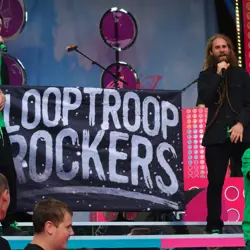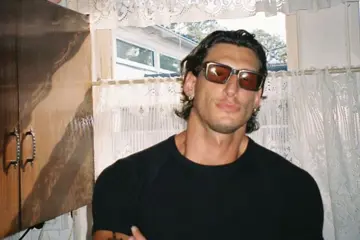 Looptroop Rockers
Looptroop RockersPaul 'Sage' Francis is a man who thinks before he speaks. Whether on record or in interviews, he knows the power of words and chooses how to use them wisely. He rose to a wide audience when in 2003 he signed to punk rock label Epitaph. While he had already built a steady following in his local abode of Rhode Island, it was this deal that opened him up to a much broader audience.
“I didn't really have a significant audience outside of the traditional rap crowd until 2001 or so, which was nine years after I started performing on stage and doing battles,” he says. “Even at that point it was more of a fringe-rap audience more than it was an indie/punk audience. I probably didn't acquire a significant indie/punk audience until I was promoted to such crowds via Epitaph circa 2003, but this probably had its beginnings in 2001 with the advent of Napster.”
Francis is often associated with being one of the first (if not the first) to see the value in mixtapes to promote his music. Collections of recordings that didn't really fit on albums, remixes and live versions of his tracks formed the make-up of Sick Of Waiting... in 1999.
Three years later, he released his debut album proper in Personal Journals, and his name as a unique voice in what was then a quite separate alternative hip hop scene was well and truly founded. He has been working on a new record for quite some time, which has been delayed slightly to mid-2014. Reluctant as he is to give away too much about how the record will sound, he confirms it will take a different approach to its predecessor Li(f)e.
Don't miss a beat with our FREE daily newsletter
“Since Li(f)e is so chilled and laid back, I always planned on having a more punchy sound on the next release, something a bit more raw. Nothing is set in stone, but that's been my aim,” he starts before offering somewhat of a scoop about the next record quite unexpectedly. “I haven't made it public yet, because I don't like naming a baby before the third trimester, but since we're on the cusp of that, fuck it. The title of the album is Copper Gone. I knew the album title before I knew what kind of lyrics or songs the album would consist of. I'm still writing it actually. [I'm] straddling a deadline like two drifting continents.”
Looptroop Rockers have never really played the game in a way that they were expected to either. While a native language hip hop scene exploded around them, Looptroop (as they were then known) shunned the popular route and released records in English. Fans were quite surprised when in 2013 they dropped their first Swedish language album.
“I had been telling the group that we should do it for years, but it wasn't until I did it myself (2009's Kråksången), and showed that it could work that I felt that they were really convinced,” he says. “Around 2000 when we released our first album, hip hop in Swedish was blowing up big time out here. The majors signed a lot of weak artists that we felt were misrepresenting the culture. So that was part of why we didn't wanna get in to it. But also because we were already building a career internationally, and we didn't wanna jeopardise that by devoting two to three years to something as marginal as hip hop in Swedish. I don't see it that way anymore, but I'm really looking forward to releasing the next album, and hopefully getting out in the world again.
Their popularity exploded when they signed in 1998 to punk rock label Burning Heart Records for their debut Modern Day City Symphony. Even as early as this first release they took on some heavy topics, including criticising the police on the track Long Arm Of The Law. Interestingly, Promoe says that he is actually more wary about political activism in music these days.
“Well, I'm more scared of the repercussions of doing certain things now,” he. “But I also learn more every day about being a human being. I used to be less in contact with my emotions, which is something I think a lot of young men have a problem with. When it comes to the music, and my lyrics, it's not harder to be political. I might not be as radical, but I'm better at writing songs that express more of what I feel, not just emotions of anger and hatred.”















